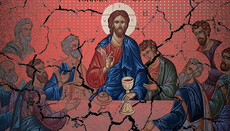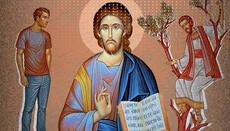Dialogue with Elders Joseph and John: The chief passions are anger and lust

We continue our talks with the Athonite elder about the passions and the means of struggle against them. Today another Spirit-bearing desert-dweller joins our conversation – Venerable John of the Ladder.
Last time we spoke with Elder Joseph about the narrow and thorny path that leads into Paradise through the gates of affliction and inner struggle. The key that opens those gates is humility. Without humility, every ascetic effort is in vain.
Yet we feel within ourselves something that resists the pursuit of holiness. Often these hindrances come from outside – from the devil, who tirelessly strives to knock us from the way of salvation. But no less often they arise from within – from our own fallen nature, wounded by original sin. This inner conflict is most fiercely revealed in two destructive passions: anger and lust.
And about them Elder Joseph speaks with stark clarity:
“The chief passions from which all others are born are anger and lust.”
The two faces of anger
“Be angry, and do not sin” (Eph. 4:26), teaches the Apostle Paul. His words are striking – for he allows that anger, in its true form, is not always sinful. Blessed Theophylact of Bulgaria speaks of a measure of anger; if a man crosses that line, he becomes a slave of malice. But before that line is reached, there is such a thing as righteous indignation – or, as the Fathers say, “sinless anger.”
For anger, in its origin, was a gift from God. It was not meant to be loosed upon our brethren, but directed inwardly – against demons, against passions, against the impulses of sin. Yet after the Fall, man forgot repentance and turned his wrath against his neighbor. Thus was committed the world’s first murder: Cain, inflamed with envy, slew his righteous brother Abel.
Slaying the serpent of wrath
Elder Joseph teaches a bold medicine for this serpent of wrath:
“With all your strength put anger to death every time it rises up; you will find it weaker the next time. Soon will blossom the fruit of long-suffering – calmness of soul. From this come peace and grace, and with them, every good thing.”
How often anger is born from the unbridled tongue! Instead of prayer, we indulge in gossip and idle words that kindle irritation, and irritation gives birth to wrath. The Apostle James warns: “The tongue is a fire, a world of iniquity” (Jas. 3:6). And again: “If anyone does not stumble in word, he is a perfect man” (Jas. 3:2).
Therefore the psalmist’s prayer must be ours: “Set a guard, O Lord, over my mouth; keep watch over the door of my lips” (Ps. 140:3).
And the elder adds a practical counsel:
“When anger seizes you, shut your mouth firmly. Do not answer the one who insults, or reproaches, or shames you, or without cause tempts you in many ways.”
Anger – a disease of the soul
Now the Sinai abbot, John of the Ladder, joins our conversation. Who better than he knows what spiritual warfare is and what a thorny ascent to Heaven! An ascetic of the desert and later abbot of the Sinai monastery, he not only traversed this path himself but also wrote a “manual” of active spiritual life – the renowned Ladder. A whole section of the Ladder is devoted to the detailed description of the chief passions. So we shall still have much to discuss with the Sinai abbot. But today let us hear what he says about the harm of anger.
“Quick temper is an untimely inflammation of the heart. Irritability is the disfigurement of the soul.”
Can the angry man be healed? John is sober: repentance requires humility, but irritability is born of pride. Thus the wrathful man finds repentance nearly impossible.
The remedy? Only patience, meekness, humility.
“The beginning of blessed meekness is to endure insults with pain of soul. Its middle – to endure them without pain. Its end, if it has an end, is to welcome reproaches as though they were praises. Blessed is he who reaches the first step, stronger still the second; but let him rejoice in the Lord who has attained the third.”
The fire of lust
Yet if anger wounds the soul, another passion enslaves both soul and body – the passion of fornication. Pride and lust are inseparable companions. As one elder used to say: “Where pride is, there is fornication also.” He would add: “Treat your passions like a red-hot stove: touch them even for a moment, and you will be burned.”
As the tongue kindles wrath, so the unbridled body inflames lust. The Apostle cries out: “Flee fornication! Every sin that a man does is outside the body, but he who commits fornication sins against his own body” (1 Cor. 6:18). The body, created as the temple of the soul, becomes instead a den of filth, where the soul is enslaved by the flesh.
The rider and the mad horse
Elder Joseph paints a vivid picture:
“Lust throws down the rider.”
A man may feel secure, like a rider astride his horse. But if the horse of lust rears and bolts, it can hurl him to the earth and trample him under its hooves. Only earnest self-restraint can tame such wild fury.
“When moderation governs all things, there is no excess of blood. Then lust cannot overthrow a man, though it still wages war against him.”
And to the one who perseveres in this struggle, God grants consolation:
“There shall blossom the flower of purity and innocence, and your soul shall rejoice with an inexpressible joy.”
John of the Ladder agrees, and he adds that each victory over lust, whatever form it takes, shines in heaven like a star:
“One binds this tormentor with labors, another with humility, another with the revelation of God. The first is like the morning star, the second like the full moon, the third like the bright sun; but all dwell in heaven.”
Two elders, two remedies
The conclusion to our conversation on the two destructive passions – anger and fornication – each of our interlocutors drew in his own way. Venerable John told how once, passing by the cells of hermits, he heard how, out of vexation and anger, they were raging alone “like partridges in cages.” To preserve their souls from destruction, the saint advised such “ascetics” not to live in solitude, “lest from men they turn into demons.”
At the same time, he saw men given over to lust and passion, yet outwardly appearing meek and affable. To them, on the contrary, he recommended solitude “as a medicine counteracting fornication and the stench of bodily impurity.” But to those who were enslaved by both anger and lust at once, the ascetic strictly forbade living according to their own will. He concluded with severity:
“The lover of pleasure destroys himself, and perhaps another – his accomplice. But the wrathful man, like a wolf, troubles the whole flock, afflicting and oppressing many souls.”
Elder Joseph does not contradict him, but adds a gentler word:
“Nothing calms anger and every passion so much as love for God and love for your fellow man. Love conquers more swiftly than all other struggles.”
And so, though we would gladly remain in the company of this “teacher of love,” Elder Joseph departs for a time from the humble cell where we have held our talks. But soon, God willing, he will return with new counsels. For now, we remain with the Sinai abbot – with whom we shall continue to speak of the passions and the virtues that oppose them.











